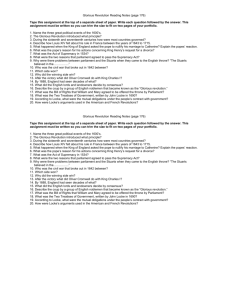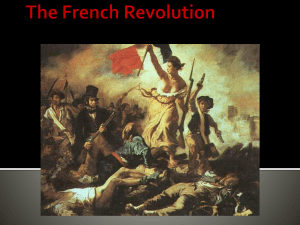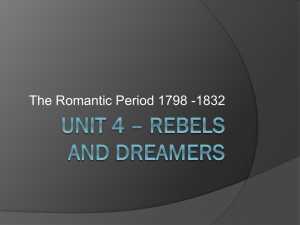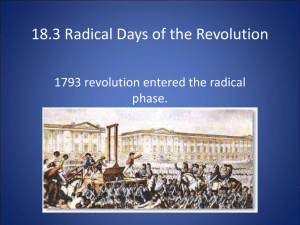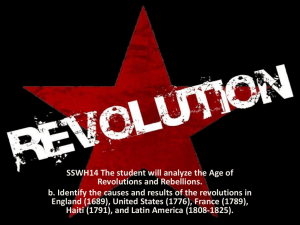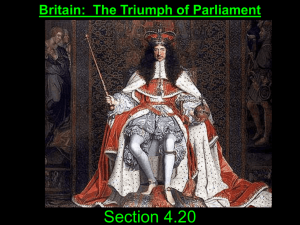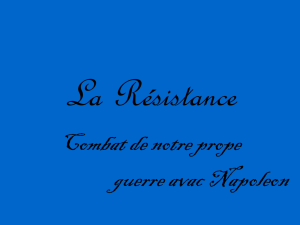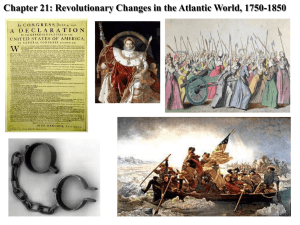Bellringer
advertisement
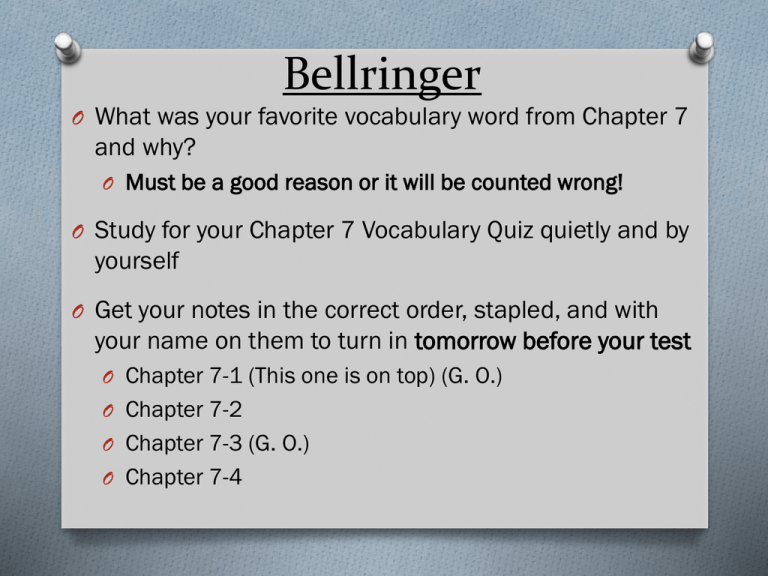
Bellringer O What was your favorite vocabulary word from Chapter 7 and why? O Must be a good reason or it will be counted wrong! O Study for your Chapter 7 Vocabulary Quiz quietly and by yourself O Get your notes in the correct order, stapled, and with your name on them to turn in tomorrow before your test O Chapter 7-1 (This one is on top) (G. O.) O Chapter 7-2 O Chapter 7-3 (G. O.) O Chapter 7-4 Bellringer O What are three facts you have learned from Chapter 7? O Put your completed Bellringer in the tray O Put your Chapter 7 Notes in the tray O Get out an old Scantron if you have one O After the test, work on your Chapter 8 Vocabulary Terms- 17 Words (Due Tuesday) Extra Credit O 3 Boxes of Tissues O Poster over 3 topics that you enjoyed learning about this year O 5 facts over each topic O 1 picture over each topic O 1 page typed paper over 3 topics that you enjoyed learning about this year O 12 point font O Times New Roman O Double Spaced O 1-inch Margins O Title Page with Name, Date, Period, and Title O Due by April 30th!!! Section 1 Review Questions 1. Who was Henry VIII? King of England who established the Church of England 2. Who was Elizabeth I? Powerful and beloved queen of England 3. Who were William and Mary? Joint monarchs of England; ruled under Bill of Rights that limited their powers Section 1 Review Questions 4. What are two accomplishments of Elizabeth I’s rule? Prevention of war between Protestants and Catholics Defeat of Spain Exploration Beginning of Shakespeare and the arts 5. What brought about the English civil war? Parliament and the monarchy disagreed about how much power each should have Section 2 Review 1. What did Galileo discover about falling objects and about the planets? Falling objects fall at the same speed Earth moved around the sun 2. According to John Locke, when do people have the right to rebel against their government? When government breaks agreement with the people Section 3 Review Questions Who was Alexander Graham Bell? Inventor of the telephone 2. Who was Thomas Edison? Invented the phonograph, electric light bulb, and developed electric systems 3. Why did so many people move from the country to cities during the Industrial Revolution? Moved to take advantage of factory jobs and because machines had replaced them in agricultural work 4. Why did workers join together to form labor unions? Wanted to improve both working conditions and pay rates 1. Section 4 Review Questions 1. Who was Maximilien Robespierre? Leader of French Committee of Public Safety 2. Who was Napoleon Bonaparte? French military leader and emperor 3. What did Napoleon do to improve life for the average person in France? Make the laws clearer and for rich or poor and allowed religious freedom 4. Why did European nations create empires? Gain access to raw materials and to buy their goods 5. Where did they buy their colonies? Africa and Asia Chapter 7 Review 1. One important outcome of England's Glorious Revolution was A. Social equality B. The bill of rights C. That Catholicism became the national religion D. The power of Parliament was weakened 2. The Golden age of science, art, and writing that took place during the rule of Queen Elizabeth I is known as England's Elizabethan Age B. Middle Ages C. Bronze Age D. Age of Writing A. 3. Why did the countries of Europe set up colonies in Africa and Asia? To get raw materials and sell goods B. To spread the ideas of the Enlightenment C. To spread the ideas of John Locke D. To prevent the loss of Parliament’s power A. 4. How did Queen Elizabeth I strengthen England? A. B. C. D. She took power away from the nobles and gave it to the people She unified the country by bringing back the Catholic religion She stopped war with France and fought a civil war She prevented war at home and went to war with Spain 5. Britain became a constitutional monarchy when William and Mary agreed to accept The laws of the Catholic Church B. The laws of the Protestant Church C. A written summary of the rights of the people D. The Declaration of Independence A. 6. In return for offering the British throne to William and Mary, Parliament demanded that all the laws had to be approved by Parliament B. King James C. The Catholic Church D. The Protestant Church A. 7. Under Napoleon, the laws of France became Different for the rich and the poor B. The same as those of the Catholic Church C. More complicated D. Clearer and easier to understand A. 8. Factory workers eventually improved their working conditions by Revolting against the Industrial Revolution B. Joining labor unions that fought for workers’ rights C. Rioting at the king’s palace D. Executing those who did not agree with them A. 9. After Louis XVI was executed, Maximilien Robespierre led the Committee of Public Safety in carrying out what became known as the Scientific Revolution B. Industrial Revolution C. Reign of Terror D. Hundred Years’ War A. 10. During the Renaissance, scientists began to draw conclusions about the universe based on Experiments that they could not control B. Ideas that they read in books C. What they had seen D. Their faith in God A. 11. After the Scientific Revolution, scientists no longer made their ideas about science fit The results of their experiments B. Their religious beliefs C. Their observations in nature D. Their political beliefs A. 12. What was one reason that the Industrial Revolution started in England? Wealthy business people had money to invest in new factories B. The constitutional monarchy forced people to work C. Small farmers demanded new jobs D. England wanted to compete with Spain’s industry A. 13. John Locke said that government was based on an agreement between rulers and The people B. God C. The Church D. Science A. 14. John Locke said that if a ruler takes away people’s rights, then people have a right to Move to another country B. Own property C. Appeal to God D. Change the government A. 15. What was one positive result of the Industrial Revolution? A. B. C. D. People were able to stay home with their children Women only had to work in the summer and fall More people were able to have comfortable lives Poor farmers could afford to buy large machinery 16. Among the group of people who agreed with John Locke’s ideas were The rulers of Germany B. The colonists in North America C. The Spanish imperialists D. The clergy A. 17. What was one negative result of the Industrial Revolution? Parents sometimes had to put their children to work in factories B. Fewer people could afford to buy textiles C. Many merchants went out of business D. The size of the merchant class decreased A. Other Items to Know! O Make sure to study the review questions at the end of each section O Make sure to study the Map at the end of the chapter O Make sure you understand how to read a line graph
